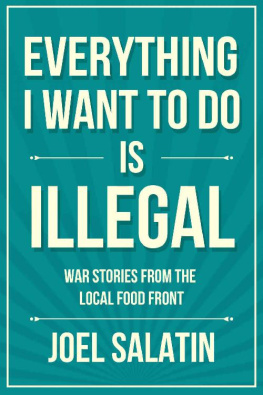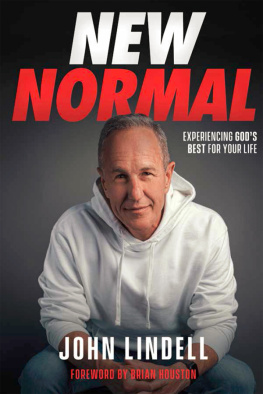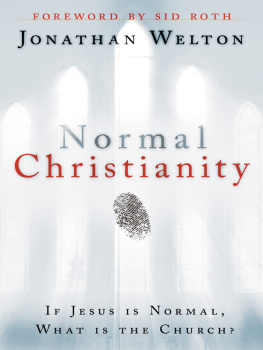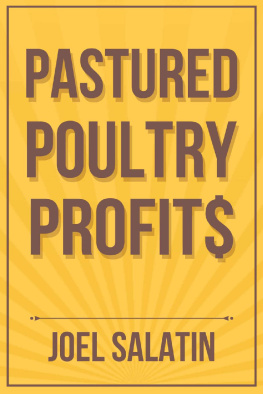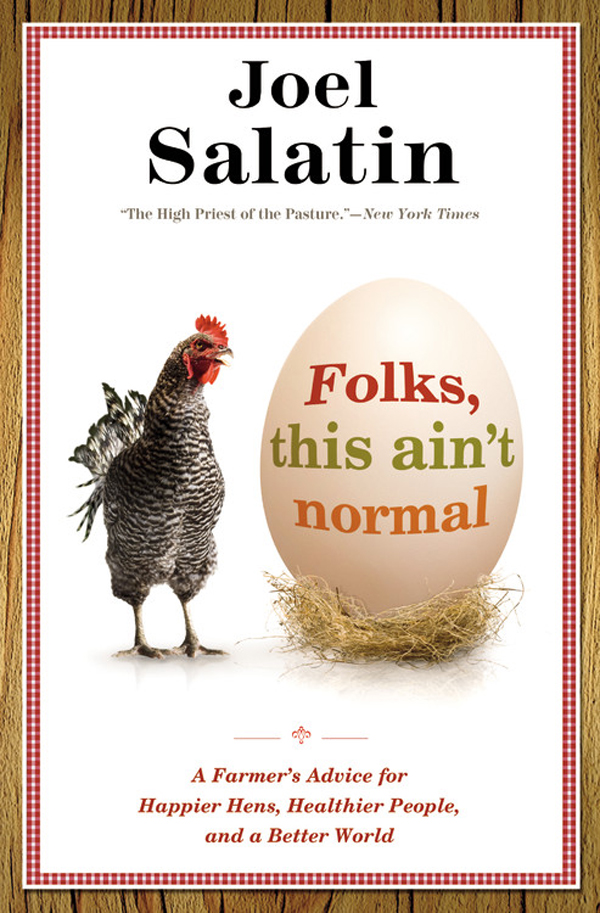Copyright 2011 by Joel Salatin
All rights reserved. Except as permitted under the U.S. Copyright Act of 1976, no part of this publication may be reproduced, distributed, or transmitted in any form or by any means, or stored in a database or retrieval system, without the prior written permission of the publisher.
Center Street
Hachette Book Group
237 Park Avenue
New York, NY 10017
Visit our website at www.HachetteBookGroup.com
www.twitter.com/centerstreet.
Center Street is a division of Hachette Book Group, Inc.
The Center Street name and logo are trademarks of Hachette Book Group, Inc.
The publisher is not responsible for websites (or their content) that are not owned by the publisher.
First eBook Edition: October 2011
ISBN: 978-1-4555-0568-5
Pastured Poultry Profits: Net $25,000 in 6 Months on 20 Acres Salad Bar Beef
You Can Farm: The Entrepreneurs Guide to Start and Succeed in a Farming Enterprise
Family Friendly Farming: A Multi-Generational Family Business Testament
Holy Cows and Hog Heaven: The Food Buyers Guide to Farm Friendly Food
Everything I Want to Do Is Illegal: War Stories from the Local Food Front
The Sheer Ecstasy of Being a Lunatic Farmer
For twenty-five years I have watched Joel Salatin and his family struggle to make a living from a hundred open acres in northern Virginia. In addition to the usual weather vagaries that afflict all agricultural enterprises, Joel and other small farmers like him has had to struggle with government dictates and regulations that, intentionally or unintentionally, have denied him direct access to the marketplace. Most of these regulations are advertised as insuring that the American consumer gets healthy food, but in reality they actually prevent it. A policy of one-size-fits-all regulation means that a regulation that is a minor nuisance to a large industrial processor is a farm killer for a farmer trying to sell directly to a consumer.
As Joel makes clear in this book, these regulations are primarily designed to prevent access to the marketplace, not to regulate food quality or healthfulness. There are no regulations on the food served at a private party or a church social where the food is given away. The regulations only come into play when the food is sold. As Joel asks, what is it about private enterprise that makes the government believe small-scale food production is suddenly so dangerous?
In an era when local foods are all the rage, federal, state, and local regulations greatly hamper the growth of this alternative to industrial foods. No doubt many urban consumers will be shocked to read of the hostile harassment and intimidation put upon small-scale food producers by government inspectors whom Joel Salatin terms the Food Police. In what other field are you considered guilty until proven innocent? And, when proven innocent, there is never a word of apology or an exculpatory press release? After a few such instances of this, would you keep trying to sell food direct to the consumer?
Unfortunately, this taxpayer-financed war against local food production has operated under the media radar. Hopefully, this book will bring it to the attention of all alternative food consumers. However, there is more to this struggle than just fighting power-mad government bureaucrats. It extends to the menus of restaurants, fast food emporiums, the purchasing policies of alternative food vendors such as Whole Foods, and even to sympathetic consumers like yourself.
The big problem is that everything new has to start small and with a simple and cheap production prototype. Few self-financed farmers have the wherewithal to start at the scale most publicly held corporate customers require. Small farmers sell their labor through their products. Consequently, they seek high-labor, low-capital systems of production just as farmers did a century ago. However, the marketplace is not as flexible as it was a century ago. A restaurant that only wants one cut of meat is of little benefit to a small-scale producer who has to sell all the meat from an animal. Similarly, making a farmer with a husband-and-wife labor force fill out reams of paperwork and forms before they can deliver one bite of food to a franchised food store is a cruel and unusual punishment.
Also, asking a natural production system to function year round is an oxymoron. Low capital input requires that the farms production model is kept in sync with the natural seasons of production. For example, you cannot raise chickens, a tropical animal, outside in foot-deep snow. Making a small farmer perform year round like an industrial factory is a sure formula for his burnout and bankruptcy, plus a recipe for a dull eating experience in the off season for you, the consumer. As the Swiss say, Winter cheese is boring cheese. In animal products, all the unique flavor nuances in heritage meat and milk come from the animal having consumed green, living grass. These flavors are not there when fed a diet exclusively of hay or silage. The small farmers competitive edge comes from producing a highly flavorful, high-skill input, seasonal product that can be marketed through a short, inexpensive, distribution chain. Local marketing not only fits this requirement but is usually essential for a profitable, self-sustaining, small-scale farm.
For local food production to continue to grow, the whole regulatory and marketing system is going to have to compromise a bit and meet the farmer halfway. Personally, I am not a my way or the highway kind of guy. Like Joel, I do not wish to see industrial agriculture regulated out of business. I just wish to see the consumer allowed to have more of a choice. None of us in alternative agriculture are opposed to government-enforced health standards. What we are opposed to are standards that dictate a high-capital solution when a lower-capital alternative is possible. Tell us what the standard is and then let us devise a way to meet it. Devising lower-capital alternatives is our stock-in-trade, and we are really good at it. Turn us loose.
Joel Salatin is an excellent example of this creativity in creating low-capital production prototypes. He singlehandedly created the North American pastured chicken industry with his low-cost, movable broiler shelters. From using pigs to aerate his compost in the spring to using truly free-ranging chickens to control flies in his pastures, Joel has figured ways to produce food with a minimum of capital inputs and no toxic chemicals. Writing a monthly column in our publication, the Stockman Grass Farmer, Joel has shared his ideas, his successes and his failures, with all who cared to read it for twenty-five years. He has absolutely no fear of people following his lead ruining his business with competition. An excellent public speaker, he has traveled the world with his message of the need for revival of a Jeffersonian, intellectual approach to agriculture. Shocking most of his audiences, he shows up to speak in a conservative business suit, white shirt and tie, to indicate that he is a college-educated entrepreneur and not the rural hayseed or neo-hippie they were expecting. Regardless of his audience, he pulls no punches when discussing his libertarian economic beliefs, his social conservatism, or his religious faith. Needless to say this completely discombobulates those who consider all alternative food producers as being from the political left.
Personally, I have long thought that Joel Salatins Polyface Farm was an excellent example of how high-value, direct-marketed farms like his could be an engine for rural economic development. Joel currently has fourteen employees; he buys all of the supplemental feed his pastured chickens and pigs eat locally, and his animals are all processed locally. Using sweat equity, he has built a two-million-dollar-a-year food business without any government loans, assistance, or subsidies. To me thats a story that should be on the front page of the


